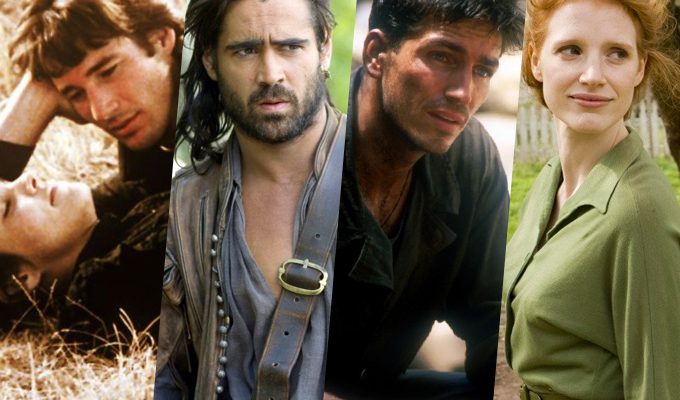 Sam Shepard as The Farmer in “Days of Heaven” (1978)
Sam Shepard as The Farmer in “Days of Heaven” (1978)
Without wanting to get into too much of a #TeamEdward vs #TeamJacob type situation, you can tell a lot about a person by how they respond to the central love triangle in “Days of Heaven.” And Sam Shepard, as the third party who unwittingly comes between Bill (Richard Gere) and Abby (Brooke Adams) ,could easily be the villain of the piece, the one who interrupts the pure, eternal, unshakable true love the other two share. But not only is that hardly Malick’s intent (was ever there a director less in thrall to the idea that love makes good people of us all?), it’s virtually impossible to imagine with such a subtle and stoically sympathetic portrayal of The Farmer. One of the most serially underrated actors of his generation, Shepard plays his nameless role so hauntingly it’s as if he is a ghost who has somehow forgotten to die just yet. Of course, that’s exactly true: he is the sickly but moderately wealthy man, the ticket to an easier life for Bill and Abby, who ruins everything by not dying when he’s supposed to, and then furthermore by proving to be lovable in his own right. So yes. #TeamTheFarmer all the way.
 Elias Koteas as Captain James “Bugger” Staros in “The Thin Red Line” (1998)
Elias Koteas as Captain James “Bugger” Staros in “The Thin Red Line” (1998)
It’s more or less the ne plus ultra of the ensemble film, in which even the vast, starry cast often takes a back seat to the influence of the flora and fauna around, so it nearly feels impossible to single out any one performance aside from that of nominal lead, Jim Caviezel. Nearly. Koteas’ performance as the mild-mannered, often derided Captain, who, in the face of the roaring bluster of Nick Nolte‘s sclerotic Lt.Col. Tall, refuses to send his men up that hill to die, risking accusations of cowardice and outright treachery, is among the first things I think of when I think of this film — my personal vote for Malick’s greatest. Apparently the role changed from Jewish to Greek mere days before filming started, but there are subtle flourishes (Koteas even mutters to himself in Greek at one point) that make it seem completely lived in. In combination with the character’s subtle, almost superstitious religiosity, and his inner conflict that rages perhaps even louder in the film’s quietest moments, Koteas’ performance is everything that “The Thin Red Line” is, at its greatest: urgent and desperate and devastatingly, bruisingly humane.
 Martin Sheen as Kit in “Badlands” (1973)
Martin Sheen as Kit in “Badlands” (1973)
Malick’s stunning debut presents a hurdle for those considering his filmography as a whole: it’s an utterly brilliant, crackling, poetic lovers-on-the-lam story that contains soon-to-be-trademark themes and images, but it’s also very unlike everything that came after in terms of its relative classicism. That’s true also of the performances, which are simultaneously extraordinary and impressive, and much less “Malickian” than almost all his others. Sheen’s Kit is a case in point. Based on a real-life person (killer Charles Starkweather), it’s almost archetypal now in its evocation of disaffected 1950s rebellion-turned-murderous: equal parts James Dean, Marlon Brando, and corner-store sociopath. In this way, unlike every other Malick film, “Badlands” refers to other films gone before, and it’s also more a product of the post “Bonnie & Clyde” 1970s independent filmmaking environment that produced it than any of his other films would be of their contemporary eras. A lot of that style of filmmaking was characterized by fiercely naturalistic and committed antihero performances, and Sheen’s Kit is a cornerstone example of that. Whether it’s a great Malick performance, if there is such a category, is debatable, but that it’s a great performance is not.

